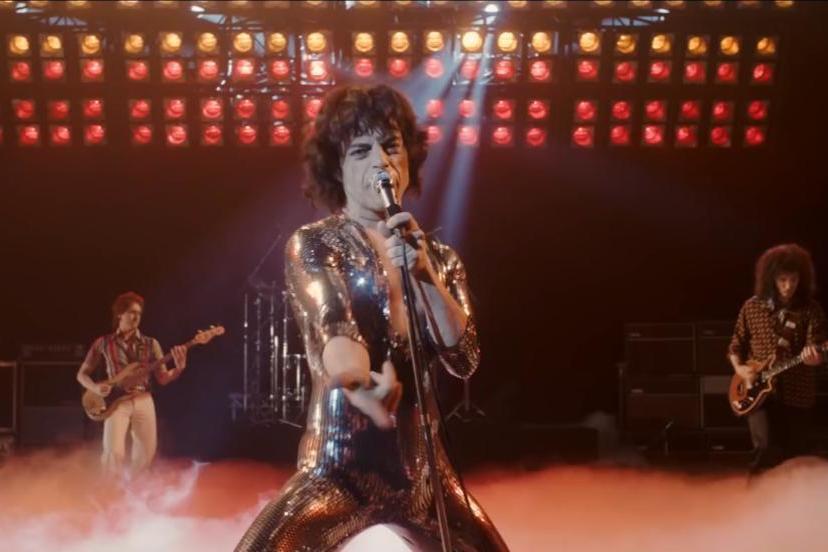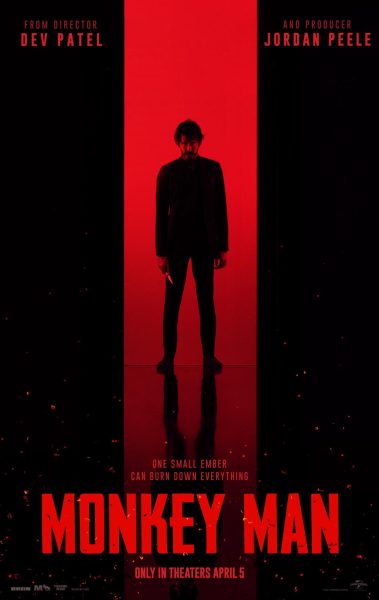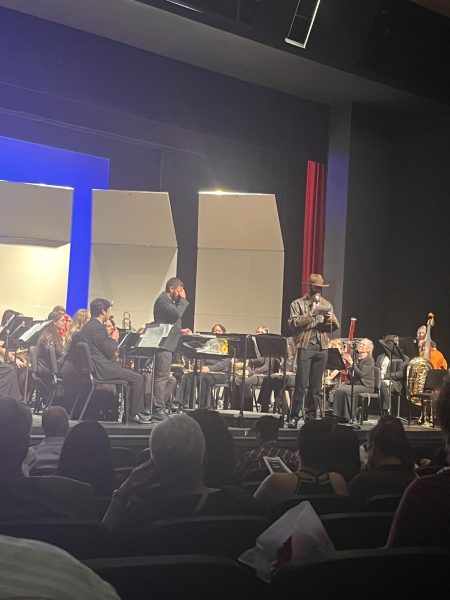‘Bohemian Rhapsody’ has music and swagger, but can’t find its voice
In ‘Bohemian Rhapsody’, Rami Malek works hard to portray Mercury but cannot rise above serious plot problems. Image from 20th Century Fox.
There are so many things ‘Bohemian Rhapsody’ had the potential to be. The story of Queen and how it basically took over the music world, and the story of Freddie Mercury have grown to mythical proportions by now. However, the movie never decides which kind of story it is going to be, and settles for a middling, old-fashioned biopic approach that will satisfy those who came for the music, but won’t surprise anyone with much else.
The film begins with a brief introduction to Freddie’s life. It portrays the beginnings of the band as a chance meeting, showing Freddie approaching Brian Mays and Roger Daltrey after seeing them perform in a small band, and becoming their lead singer. From there, the film thinks it’s necessary to slog through every scrapbook moment in the band’s history, changing the timing and placement of events as they actually happened to fit the film’s narrative.
It seems like several movies are fighting to have their way within this one movie, as the story switches from a sketchbook montage journey through Queen’s early star-making moments, to a dramatic attempt to address Mercury’s romantic relationships and discovery of AIDS, to a pat, overwrought climax using the Live Aid concert to bring the bandmates back together. Directed by Bryan Singer (with credits on the X-Men films), the film probably suffered from the rumored on-set problems, such as disagreements between its lead and singer, who was fired from the set a few weeks before completion.
But, that’s no excuse for its inability to understand Freddie. At times, it wants to care about Freddie’s connection to his parents – later, it wants to develop Freddie through his relationship with manager Paul Prenter, but clumsily plods through Freddie’s private life without trying to understand him. Neither of these plot threads are satisfyingly developed or ever feel genuine.
One of the most glaringly painful problems of the film is in its careless reconstructing of events. For example, making Live Aid the film’s climax leads to Mercury discovering he has AIDS years before he actually found out (in 1987), telling his bandmates about his diagnosis a week before the concert, and then having him track down his real-life partner Jim Hutton on the same day the concert, takes place at Wembley Stadium. If you have to revise history this much to make your movie work, there’s a serious problem with the story you’re trying to force on the audience, rather than telling the story as it actually took place.
While some critics are already praising the casting of Rami Malek (“Mr. Robot”) as Freddie, I was much more amazed at the spookily accurate casting of Gwilym Lee as Brian Mays and Ben Hardy as Roger Taylor. While Malek certainly knows the serpentine swagger and brazen flamboyance of the real Mercury, one can never quite buy into the fantasy in quiet moments, when he must interact with other characters, until much later in the film. That can’t be blamed entirely on Malek- that would be like casting Michael Jackson by this point. He does have several scenes with girlfriend Mary Austin (played by Lucy Boynton) that demonstrates Malek’s hard work to tap into the rock legend’s inner turmoil.
However, the prosthetic teeth seem to be wearing him for half of the film, particularly in those titular dramatic moments and, in my opinion, in combination with his large, very expressive eyes that make it difficult to believe him as Freddie, until he puts the iconic shades on. I actually had moments where I speculated whether Malek would make an excellent Mick Jagger instead.
The real trouble beyond the prosthetics, though, is that the movie isn’t truly interested in who Mercury really was or how his larger-than-life stage persona was developed. The movie careens through scene after scene of what the general population thinks songwriting is like, and has little to no interest in why Freddie is a born performer and what qualities made him so irresistible around the world.
The only time when the film finally feels something like what it could have been, is in using the Live Aid concert as a way for Freddie to fight back against the AIDS, he now knows is consuming him. The film conveys the majesty of the band best when it understands Freddie’s commitment to keep the show going at any cost. But, even then, it fails in this climax, by forcing us to sit through a reenactment of the entire historic benefit concert (leaving out “Crazy Little Thing Called Love”). Just watch this instead.
Once you watch the real Live Aid show, it’s clear how pointless this film really was. Why even attempt to reenact this set? Why did anyone have to be cast as, and try to, portray Freddie Mercury? More can be learned about the real Mercury and what being a performer meant to him by just watching these real 20 minutes in history.
As a fan of Queen and of rock icons, I had many hopes for what this film could be. While I was not appalled by the end, I was bored and cringing throughout most of the film. When your focus is someone as vibrant, once-in-a-generation and truly alive as Mercury, that spells failure for any biopic. Ultimately, it believes so wholeheartedly in the mythical stature of its characters that it cannot find a real film to tie together all of the elements, or really get to know its frontman. You would do better to watch a documentary about Queen instead.
Final Score: 2/5 Stars
Natalie Hanson can be reached at [email protected] or @NatalieH_Orion on Twitter.















